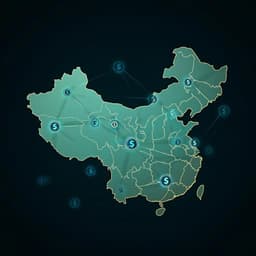
Linguistics and Languages
The evolution and development of ecotranslatology studies based on the analysis of CiteSpace mapping knowledge domains
X. Xiong, H. Qin, et al.
Dive into the fascinating evolution of ecotranslatology research in China from 2001 to 2022, as investigated by Xin Xiong, Hui Qin, and Xiangtao Liu. Discover how research transitioned from foundational theory to practical applications, revealing key insights and highlighting areas needing further exploration.
~3 min • Beginner • English
Introduction
The paper situates ecotranslatology within broader developments in translation studies, noting Western shifts (linguistic, cultural, sociological turns) and the emergence of an ecological perspective in China in the early 21st century. Ecotranslatology integrates Chinese and Western ecological thought to examine translation phenomena, processes, and essence. Given two decades of growth, increasing publications, and evolving hotspots—yet persistent open questions—the study aims to systematically review 21 years of ecotranslatology research. Using scientometric visualization (CiteSpace), it seeks to map the research landscape, identify academic groups and hotspots, compare domestic and international trajectories, and provide guidance for future research directions.
Literature Review
Ecotranslatology is a Chinese-origin theoretical paradigm initiated by Hu Gengshen (2001 conference paper; 2004 monograph Translation as Adaptation and Selection). Its theoretical construction has focused on key concepts such as translation as adaptation and selection, translator-centeredness, translational eco-environment, ecological paradigm, and green translation. While influential in constructing a Chinese discourse in translation studies, the field faces critiques: questions about its core concepts and derivation of translator-centeredness from Darwinian adaptation; and reflective debates on its scope and logic. Application studies span literary, subtitle, cultural, and political translation, but issues like imposed interpretation or theoretical affiliation have been noted. Prior reviews have been largely qualitative and subject to authorial frameworks; quantitative/bibliometric reviews exist but are limited and have not fully captured stage characteristics or deeper trends. Hence, a visualization-based, data-driven synthesis is proposed.
Methodology
Data sources and retrieval:
- International literature: Web of Science Core Collection (SCI-Expanded, SSCI, A&HCI, CPCI-S, CPCI-SSH). Topic search: TS("eco-translation" OR "eco-translatology" OR "translation ecology" OR "ecological translation") and TS("adaptation and selection AND translation"). Document types: article (thesis), conference paper, book review. Timeframe: 2001-01-01 to 2022-01-01. After screening, deduplication, and removal of irrelevant items, 69 valid items remained (earliest 2003; latest Jan 2022).
- Chinese literature: CNKI. Advanced searches using "adaptation" AND "selection" then refined by "translation"; a second search using "ecotranslatology". Excluded non-research items (announcements, appointments, columns, updates, catalogs, book reviews). Data converted to WOS format in CiteSpace for deduplication, yielding 2721 valid documents (total research literature database).
Stage division and core set:
- Three stages identified from yearwise distributions: 2001–2008 (theoretical formative), 2009–2014 (theoretical development), 2015–2022 (advanced development and application). A core literature database was constructed by filtering 217 core journals and CSSCI papers from CNKI; subsequent analyses used this core set.
Tools and parameters:
- CiteSpace V 5.8.R3 (64-bit) used for co-occurrence and visualization (authors, institutions, keywords). Parameters adjusted (Time Slicing, Years Per Slice, Threshold, Top N, Pruning). Clustering quality assessed via Modularity Q (>0.3) and Silhouette S (>0.7). Pathfinder pruning used for keyword networks. Example settings shown for Fig. 7: Timespan 2004–2022 (slice=1), selection via g-index (k=25), LRF=3.0, L/N=10, LBY=5, e=1.0; Network N=273, E=317 (Density=0.0085), Largest CC=120 (43%).
Analytic procedures:
- Author co-occurrence to reveal key scholars and collaboration networks; institution co-occurrence to map active affiliations; keyword co-occurrence to identify hotspots and their evolution. Python-assisted tabulation of article volumes, authors, and institutions (Tables 1–2). Centrality inferred from purple-ringed nodes (≥0.1) to mark hotspots/turning points. Domestic and international datasets analyzed separately and comparatively.
Key Findings
- Output growth and stages:
- Chinese ecotranslatology exhibits three stages: 2001–2008 formative (low volume), 2009–2014 development (rapid growth; total core and overall volume peak in 2014 with total 292), 2015–2022 advanced/applied phase (overall ~260 articles/year; core literature rarely exceeds 20 except in 2021).
- International publications (n=69) show an overall upward trend from 2001 to 2022, with a peak around 2017; overall global volume is smaller and lags China.
- Academic groups and collaboration:
- A prominent founding school led by Hu Gengshen is evident, with high output, citations, and centrality; close links with Meng Fanjun, Song Zhiping, and Luo Dijiang suggest a core team.
- Debate- or application-oriented scholars (e.g., Leng, Mu & Yang, Wang, Deng, Huang, Du & Wang) do not form strong clusters; contributions are more independent and discontinuous.
- Author co-occurrence indicates sparse collaboration: co-occurrence/node ratios decline across stages (Table 1: 0.14 → 0.08 → 0.06), reflecting limited effective collaboration despite more authors.
- Institutions:
- High-centrality Chinese institutions include Tsinghua University, Zhengzhou University, Macao Polytechnic Institute, Guangxi University of Science and Technology, and Southwest University—largely linked to Hu and his students.
- Institutional diversity grows (node/frequency ratio rises 0.33 → 0.44 → 0.42; Table 2), and interinstitutional collaboration increases (co-occurrence/node ~0.33–0.38), but research remains concentrated in universities; contributions from research centers/industry are limited.
- Internationally, scattered nodes with limited collaboration; notable clusters include Pennsylvania State University and University of California system units. Leading international contributors (by small counts) include Jilin Business & Technology College and Nanchang Institute of Technology.
- Hotspots and their evolution (China):
- Early (2001–2008): focus on theory-building around “translation theory,” “adaptation,” and “selection”; “ecotranslatology” not yet central.
- Development (2009–2014): emergence of “eco-translation,” “translation ecology,” “translator,” “three-dimensional transformation,” “translator-centeredness”; return to disciplinary ontology via “ecological ethics,” “ecological balance”; applications to film translation, authors (Lin Yutang, Zhang Ailing), and public communication.
- Advanced (2015–2022): “ecotranslatology” becomes a dominant high-centrality keyword, with philosophical self-reflection (“ecological paradigm,” “green translation,” “ecological orientations,” “ecocriticism,” “school awareness”) and newer applied areas (“ethnic classics,” “traditional medicine,” “public language”). However, empirical/quantitative terms (e.g., “survey,” “empirical evidence”) are notably absent.
- Hotspots (international):
- Central terms: “ecological translation,” “translational eco-environment,” “adaptation and selection,” “adaptive selection,” “three-dimensional transformation,” with many items clustered in 2015–2017.
- The term “ecotranslatology” itself is less visible internationally, indicating weaker dissemination of the core label.
- Burst terms (2015–2022): “translational eco-environment,” “three-dimensional transformation,” “development trend.”
- Overall thematic shift:
- From grand, abstract theory founding to confirmation/verification (2009–2014) and subsequent revision and applied studies (since 2015), with an expansion from theoretical to more specific, practice-oriented topics.
- Methodological gap:
- A marked shortage of quantitative research, comparative studies, and field/empirical investigations across both domestic and international corpora.
Discussion
The scientometric mapping clarifies how ecotranslatology has matured from inception to a more diversified, application-aware phase, addressing the study’s aim to identify research groups and hotspots. The dominance of a founding school explains the field’s coherent theoretical progress, while sparse co-authorship and limited institutional diversity reveal structural constraints that may hinder cross-fertilization and critical development. The hotspot evolution—from adaptation/selection theory to translator-centeredness, eco-paradigms, and applied domains—demonstrates theoretical consolidation and tentative practical expansion. Internationally, the weaker presence of the term “ecotranslatology” and lower publication volume suggest dissemination lags and the need to strengthen global scholarly engagement. The sustained absence of empirical/quantitative keywords indicates an underdeveloped evidence base, limiting generalizability and theory testing. These findings collectively suggest that responding to critiques, fostering broader collaborations and institutional heterogeneity, and integrating empirical methods are pivotal for the field’s next phase and for enhancing ecotranslatology’s international visibility and impact.
Conclusion
The study maps 21 years of ecotranslatology, identifying a core founding research group (led by Hu Gengshen), evolving research hotspots across three stages, and structural features of authorship and institutional collaboration. It contributes a data-driven synthesis distinguishing domestic and international trajectories and reveals a shift from foundational theorizing to revision and applied studies. Future directions include: (1) addressing doubts and critiques through systematic theoretical refinement; (2) cultivating stable, diversified, and heterogeneous research teams and institutions to strengthen collaboration; (3) enhancing internationalization via conferences, journals, and targeted dissemination of Chinese scholarship; (4) expanding empirical, field-based, and quantitative studies to complement qualitative work; and (5) tracking global ecological discourses to enrich and update ecotranslatology’s concepts and applications.
Limitations
The study is temporally bounded to publications from 2001-01-01 to 2022-02-01 (CNKI) and up to 2022-01-01 (WOS), potentially omitting subsequent developments. The datasets derive from CNKI and WOS using keyword-based retrieval and exclusion of non-research items; relevant literature outside these sources or terms may be underrepresented. The international corpus is relatively small (n=69), limiting generalizability. Findings rely on co-occurrence and visualization (CiteSpace) which capture structural patterns but require interpretive judgment and may miss nuanced content not reflected in metadata/keywords.
Related Publications
Explore these studies to deepen your understanding of the subject.







